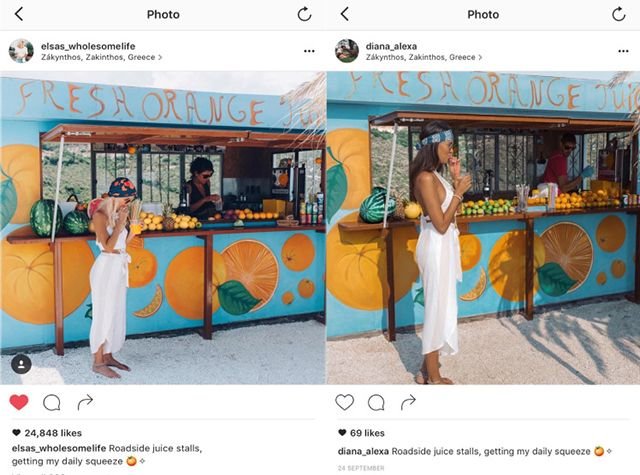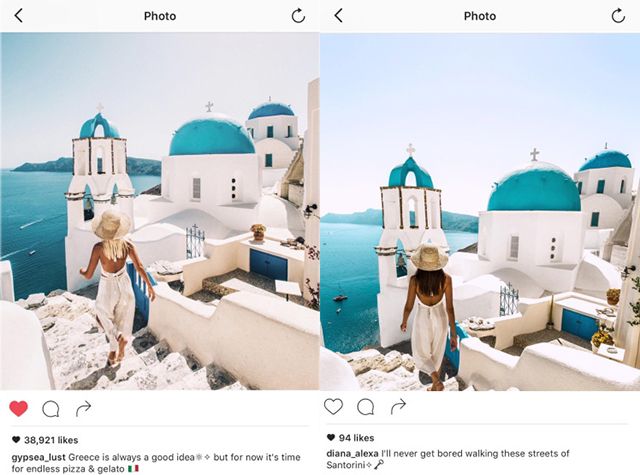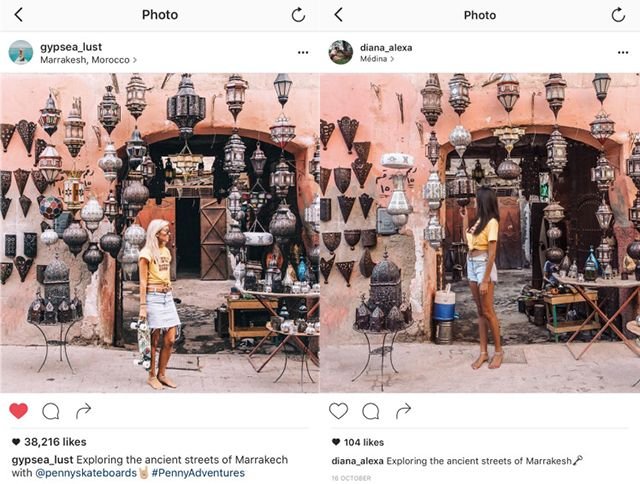 On a scale of one to 10, how original are you?
On a scale of one to 10, how original are you?
Say, when you bought your first tube of liquid lipstick, did Kylie Jenner’s infamously pouty lips have anything to do with your decision to make that purchase? Can you swear on your life that your sudden obsession for tulle is not at all influenced by Maria Grazia Chiuri’s debut collection for Dior? And for goodness sake, are you truly, irrevocably a feminist, or are you just claiming to be one because it sounds cool in the age of Taylor Swift? I have a lot more examples in mind, but you probably already get the point—in this day and age, it can be argued that originality is overrated.
You see, we live in a social media-driven world, and every single day we are impressed by one’s so-called creativity. Browse through your Instagram’s “explore” tab and you’ll chance upon a number of people worthy of the “follow” button: talented photographers whose snaps never fail to take your breath away, travel bloggers who’ll make you want to instantly book a flight, street style stars whose OOTDs you’re itching to cop, or just some cool kids who happen to be your definition of #feedgoals. While all these posts would, without a sliver of doubt, score hundreds or even thousands of insta-hearts, you can’t say for sure they are a hundred percent original. (I can bet my bottom dollar that your Instagram-obsessed friend wasn’t the first one to have come up with a mostly-white, minimal-inspired grid.) Just like you, they probably draw inspiration from other people, too.
What’s originality, anyway?
If you run a quick Google search on the word “original,” you’ll easily find that it’s synonymous to “first” or “earliest.”
To help you better understand, imagine this scenario: you’re at the beach (think blue skies, crystal clear waters, white sand, and a palm tree that’s conveniently peering into the frame). You ask a friendly local to take a photo of you facing the horizon and with a coconut in one hand. It’s a beautiful, failsafe picture guaranteed to earn your followers’ likes, and it was shot using your newly bought iPhone or mirrorless camera—how could this possibly not be original? Well, we hate to burst your bubble, but we can think of several other bloggers who have done the same exact shot like yours. So nope, you’re probably not the first to take a beach photo in that pose and with that prop. (But sure, here’s a double-tap for you!)
Perhaps, unconsciously, you’ve seen it from somewhere and the idea was stuck in your head. Although you may also argue that you had no idea about it beforehand. But hey, even if you had, allow us to set the record straight: There’s nothing wrong with drawing inspiration from someone or something.
Case in point: the #followmeto couple, Murad and Natalya Osmann. Theirs is the perfect example of a brilliant idea that creatively promoted tourism and challenged fellow creative minds. The unique way they document their travel photos became a social media sensation and led others to do the same, which was something they encouraged rather than fought against. Not long after, countless others have mimicked their signature pose and even started using the same hashtag that they gave birth to. So ultimately, in their case, imitation is indeed the sincerest form of flattery.
On plagiarism and copycats
However, while being inspired by someone else’s work is not a bad thing, there’s still a big fat line that separates it from blatant copying. You’d think that some people would know better than to cross that line, but there are others who dare to claim other people’s ideas and pass them off as their own. Thus the term “copycats.”
Take local blogger Camie Juan’s case, for example.
For years, she’s had to deal with someone who constantly imitates her, from her choice of outfit and hair color down to her blog layout, photo-editing style, and even mannerisms. “It could easily be disputed with ‘people can have similar tastes,’ so for years I didn't want to assume the worst and [thought] maybe we really were just similar,” she tells her story to Preview. “What sealed the deal was when she plagiarized a blog post of mine. After that, all benefit of the doubt was thrown out the window. Her copying was already pretty apparent with her pattern of changing her hairstyles, her clothing, even her interests, to match mine. But plagiarism is the highest form of inexcusable behavior.”
In case you’re wondering, Camie did not personally know her alleged copycat. In fact, she had zero idea of her existence until someone messaged her on Tumblr to point out that parts of her website are being copied by another blogger. Soon after, more people from the blogging community also noticed the eerie similarities between their blogs, which naturally alarmed Camie and led her to confront her copycat.
“Initially, when the issue started in Tumblr, it was mostly [me] calling her out or others calling her out about it. The issue got really big and toxic, so I emailed her to apologize for how bad the entire situation is. [I even went] as far as to saying I do believe she was copying me and wish she'd stop, but I also apologized for the hate she was getting. She apologized in return but never explicitly said for copying,” Camie recalls. “Things quieted down a bit for three months and then she started all over again. It was a cycle with her.”
The public feud with her copycat—which Camie describes as “a rollercoaster ride”—has been going on for almost eight years now, but the plagiarism never really ended and has even reached a whole new level of crazy. Even after Camie blocked her on social media, she was told that the copycat would create fake accounts in order to follow her and to stay updated about her new posts. “I think it's because in her head she truly didn't think she was doing anything wrong even though she would clearly stalk me online and go as far as copying not only my personality but my mannerisms—there is proof in YouTube,” Camie adds.
When things are dramatically blown out of proportion
Camie’s story on its own is already a disturbing example of how “drawing inspiration” can go so far, but late last year, another case flabbergasted the internet. Lauren Bullen, an Australian travel blogger, claimed to have a creepy copycat who followed her around the world to imitate her photos. The similarities between her posts and an IG user named @diana_alexa’s are striking and on point down to the tiniest details: the poses, filters, outfits, and sometimes even captions.
Lauren noted that the copycat refused to acknowledge what she did wrong. She wrote in her now-deleted blog post, “When I messaged her about discovering her page and how crazy and ridiculous I thought it was, she tried to justify it by just saying everyone copies us and even big accounts are taking same pictures at the same place and told me I should make my pictures private if I don’t want this to happen.” Below are some side-by-side comparison of their pictures that will easily make anyone cringe to the core.




News spread like wildfire, and naturally, online sleuths couldn’t help but come up with conspiracy theories. They were quick to suspect Lauren of faking the copycat photos and staging this whole drama for a publicity stunt and to acquire more followers. “Many of Bullen's geotags only list cities, not exact locations. It would have taken an absurd amount of time, money, and effort for Diana to track down the exact fruit stands or market vendors that serve as Bullen's backdrop,” Insider pointed out.
Some netizens also felt that things just don’t add up in Lauren’s story, accusing her of a hoax. She responded to the accusations in an interview with Cosmopolitan UK: “I've heard the speculations and honestly it's so disappointing when you share an experience and it goes viral without you ever wanting that, and then it gets turned around and put back in your face… Everybody just loves a twist in the story and is looking for any way to cause more media and more drama, when it's as simple as the fact that we shared what we discovered… I'm seriously so disheartened that people are turning this around and accusing me.”
Welcome to the internet
The concept of originality, as you can now tell, is quite complex. In the same sense that Marilyn Monroe and Madonna—who are both style icons in their own right—have an almost identical signature look, it’s hard to claim dibs on an idea that you feel is one hundred percent your own. So is nothing really original anymore? Are we just to accept the fact that this is the point where creativity dies?
While we have copyright laws that should supposedly protect someone’s intellectual property from being stolen, there are sadly loopholes that a copycat can also deftly get around with. The internet is a black hole where anyone can easily draw inspiration from or blatantly copy someone, and unfortunately the line that separates the two gets blurrier every second. Social media, at the same time, is a place that’s open for debate all day, every day: Person A is free to call out Person B for plagiarizing his/her work; Person B is free to defend himself/herself and argue that it’s an original idea as well or that nothing really is anymore; and Person C is also free to give his/her unsolicited opinions on whatever issue is taking place at the moment, subjecting the people involved into further public scrutiny. Ironically, this is a price we way pay for today’s “free” internet.
So again, we ask: On a scale of one to 10, how original do you think you are?
Wellcome to the community!
Downvoting a post can decrease pending rewards and make it less visible. Common reasons:
Submit
Wellcome to steemit
Downvoting a post can decrease pending rewards and make it less visible. Common reasons:
Submit
Welcome to steemit!
I know that steemit may seem very overwhelming to you right now but don't worry. There's a learning curve to everything so just be patient and you'll be churning out posts and becoming a part of something great in no time!
Also if there are any questions that you may have, then just ask your questions on any of my blog posts or in a reply below and I'll be more than happy to assist you with whatever questions you may have! I will also be creating a basic starting out guide for all minnows and newcomers on my blog so do give it a read as that might help answer many of your questions!
Have fun and I wish you LOADS of success on here! :)
Also. you can call upon originalworks whenever something you post is your own content like this: @originalworks
Regards
@welcome-to-steem
Downvoting a post can decrease pending rewards and make it less visible. Common reasons:
Submit
The @OriginalWorks bot has determined this post by @francesgardose to be original material and upvoted(1.5%) it!
To call @OriginalWorks, simply reply to any post with @originalworks or !originalworks in your message!
Downvoting a post can decrease pending rewards and make it less visible. Common reasons:
Submit
my unsolicited opinions are exactly as daringly original as a good ol' WatchMojo video
Downvoting a post can decrease pending rewards and make it less visible. Common reasons:
Submit
true!!! :)
Downvoting a post can decrease pending rewards and make it less visible. Common reasons:
Submit
Goodlock in steemit.com
Downvoting a post can decrease pending rewards and make it less visible. Common reasons:
Submit
This was extremely thought provoking on a number of levels - particularly begging back to the ultimate question which is what is originality anyways? For example, we live in a society today where virtually every possible chord progression in music that sounds good together has been played together at some point. music has structure; it's rigid in that aspect yet, still we have new music everyday using the same chord progression as the song that played a million times on the radio the day before. If you ask me, the concept of originality or plagiarism is akin to Good and Evil meaning they're entirely subjective. What some would consider evil, others consider it the right way. True originality is a fleeting concept considering we're all just amalgamations of a world culture based around constantly copying people we look up to or what we think is cool at that time.
Downvoting a post can decrease pending rewards and make it less visible. Common reasons:
Submit
plagiarism is the greatest form of flattery
Downvoting a post can decrease pending rewards and make it less visible. Common reasons:
Submit
Welcome to Steemit :)
Downvoting a post can decrease pending rewards and make it less visible. Common reasons:
Submit
thank you :)
Downvoting a post can decrease pending rewards and make it less visible. Common reasons:
Submit
This ia so true. Free information and contwnt from the internet is a basic commodity but it also risks people parasiting off individual work, personal content and intellectual property. It ia really hard but like you said, it always pays off to be genuinely original. I hope you stay true to yourself and continue to post original content!
Downvoting a post can decrease pending rewards and make it less visible. Common reasons:
Submit
Downvoting a post can decrease pending rewards and make it less visible. Common reasons:
Submit